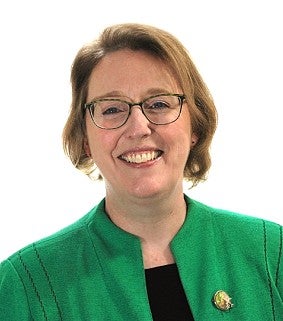Faculty bio | 541-346-3828 | X / Twitter
Biography:
Ellen Peters is an academic expert in decision-making and the science of science communication. Her primary research interests are how people judge and decide, and how evidence-based communication can boost comprehension and improve decision-making in health, financial, and environmental contexts. She is especially interested in the basic building blocks of human judgment and decision making—such as emotions and number abilities—and their links to effective communication techniques. These processes are also central to the effects of adult aging in decision-making as well as to public policy issues, such as how to communicate about the health effects of smoking or the pros and cons of cancer screenings and treatments. She is also interested in methods to increase number ability, a.k.a. numeracy, to improve decision-making and, in turn, health and financial outcomes.
As the director of the Center for Science Communication Research at the University of Oregon, Ellen explores how policy makers, physicians, and other experts can enhance public understanding of science and technology by advancing the science of science communication.
Recent News:
- Why embracing uncertainty can be a clinical superpower (Medscape, March 2, 2026)
- Numbers are persuasive—if used in moderation (Scientific American, Oct. 16, 2024)
- UO researchers work to tell public: Smoke is harder on children (The Jefferson Exchange, July 31, 2024)
- How do science journalists decide whether a psychology study is worth covering? (The Good Men Project, Nov. 28, 2023)
- Conflicting mask policies in Philadelphia are leaving many confusion and concerned (National Public Radio, April 20, 2022)
- The better you are at math, the more money seems to influence your satisfaction (The Conversation, Jan. 20, 2022)
- Why Covid has broken parents’ sense of risk (The New York Times, Sept. 15, 2021)
- COVID and schools: the evidence for reopening safely (Nature, July 7, 2021)
- What Are the Odds? Even Experts Get Tripped Up by Probabilities (The Wall Street Journal, June 11, 2021)
- Numbers can trip you up during the pandemic – here are 4 tips to help you figure out tricky stats (The Conversation, April 27, 2021)
- Using data to fuel more robust and persuasive messaging (Ragan, April 1, 2021)
- Do 'maximisers' or 'satisficers' make better decisions? (BBC, March 29, 2021)
- Psychologist: Convey Seriousness Of Events Through Stories, Not Numbers (Wisconsin Public Radio, Dec. 28, 2020)
- To tackle pandemic, Biden must overcome distrust and division (Science Magazine, Nov. 13, 2020)
- Employers Need to Reinvent Retirement-Savings Match (Harvard Business Review, Oct. 19, 2020)
- Are You an Investor or a Gambler? The Stock Market Knows. (The Wall Street Journal, Sept. 11, 2020)
- How the psychology of pandemic behavior can help guide containment strategies (KQED, June 29, 2020)
- For this psychologist, the coronavirus offers a unique opportunity to study ourselves (Discover Magazine, May 21, 2020)
- UO study finds new links to dehumanization of immigrants (OregonNews, April 23, 2020)
- Social scientists scramble to study pandemic, in real time (Science Magazine, April 8, 2020)
- Precautionary behavior around coronavirus aligns with perceived risk (WBUR, March, 21, 2020)
- Communicating about COVID-19 (Oregon Public Broadcasting, March 12, 2020)
- Is obsessing over daily coronavirus statistics counterproductive? (The New York Times, March 12, 2020)
- Study will look at perceived risk of new coronavirus in real time (OregonNews, March 6, 2020)
- Americans still trust doctors and scientists during a public health crisis (The Conversation, March 5, 2020)
- Curious: The Science of Communicating Science (Jefferson Public Radio, Jan. 10, 2020)
- Maths teaser that adds up to better health and wealth (The Times, Oct. 5, 2019)
- Math skills aren’t enough to get through hard decisions – you need confidence, too (The Conversation, Sept. 9, 2019)
- Leader named for new Media Center for Science and Technology (OregonNews, June 12, 2019)
- Fear of math is harmful to your health. This woman wants to help. (Philadelphia Inquirer, June 29, 2018)
- Powell: How to embrace risk and make better money decisions (USA Today, April 18, 2018)
- Mathematics Adeptness Will Keep You Healthy & Wise, Researchers Say This Is a Must-Have Skill: Poor mathematical skill may lead to negative impact on health conditions and everyday lives (News Guards, March 9, 2018)
- How Poor Number Skills Are Hurting Americans’ Health: Here are five ways doctors can help (The Wall Street Journal, “Custom Studios,” July 14, 2017)
- Math class isn’t as pointless as you once thought (New York Post, July 13, 2017)
- Know your numbers: Arithmetic and better health (CBC News, February 26, 2017)
- The chemicals in burnt toast and crispy fries won't kill you, but the calories might (Popular Science, Jan. 27, 2017)
- What’s the Best Way to Convince a Climate Change Denier? (NPR Science Friday, Jan. 6, 2017)
- Are you listening when we do the numbers? (NPR Marketplace, Aug. 2, 2016)
- Let Smokers See the Warning They Need (New York Times Opinion, June 3, 2016)
- Study: Graphic cigarette labels really do work (Philadelphia Inquirer, Dec. 31, 2015)
- Smokers are more likely to quit if they see disgusting images of what smoking does (New York Daily News, Dec. 23, 2015)
- Smoking bans, taxes encourage quitting, study finds (The Columbus Dispatch, Dec. 23, 2015)
- Graphic Warnings on Cigarettes Help Smokers Consider Quitting (U.S. News & World Report, Dec. 23, 2015)
- A Good Mood Boosts Brainpower in the Aged (The Wall Street Journal, “Ideas Market,” Feb. 6, 2013)


